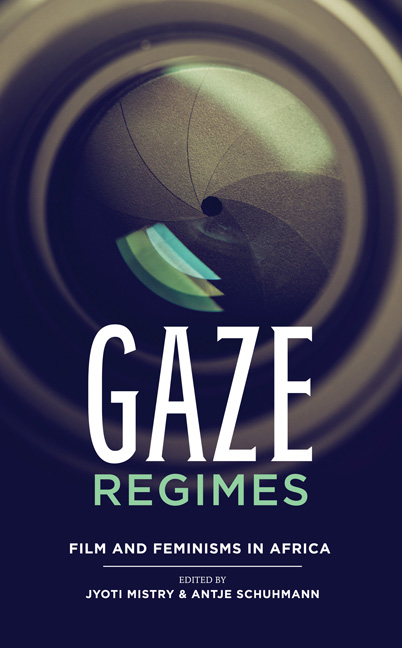Book contents
- Frontmatter
- Contents
- Acknowledgements
- Foreword: Goethe-Institut sub-Saharan Africa
- Introduction: By way of context and content
- 1 African Women in Cinema: An overview
- 2 ‘I am a feminist only in secret’
- 3 Staged Authenticity: Femininity in photography and film
- 4 ‘Power is in your own hands’: Why Jihan El-Tahri does not like movements
- 5 Aftermath – A focus on collective trauma
- 6 Shooting Violence and Trauma: Traversing visual and social topographies in Zanele Muholi's work
- 7 Puk Nini – A Filmic Instruction in Seduction: Exploring class and sexuality in gender relations
- 8 I am Saartjie Baartman
- 9 Filmmaking at the Margins of a Community: On co-producing Elelwani
- 10 On Collective Practice and Collected Reflections
- 11 ‘Cinema of resistance’
- 12 Dark and Personal
- 13 ‘Change? This might mean to shove a few men out’
- 14 Barakat! means Enough!
- 15 ‘Women, use the gaze to change reality’
- 16 Post-colonial Film Collaboration and Festival Politics
- 17 Tsitsi Dangarembga: A manifesto
- Acronyms and Abbreviations
- List of Contributors
- Filmography
- Index
7 - Puk Nini – A Filmic Instruction in Seduction: Exploring class and sexuality in gender relations
Published online by Cambridge University Press: 20 April 2018
- Frontmatter
- Contents
- Acknowledgements
- Foreword: Goethe-Institut sub-Saharan Africa
- Introduction: By way of context and content
- 1 African Women in Cinema: An overview
- 2 ‘I am a feminist only in secret’
- 3 Staged Authenticity: Femininity in photography and film
- 4 ‘Power is in your own hands’: Why Jihan El-Tahri does not like movements
- 5 Aftermath – A focus on collective trauma
- 6 Shooting Violence and Trauma: Traversing visual and social topographies in Zanele Muholi's work
- 7 Puk Nini – A Filmic Instruction in Seduction: Exploring class and sexuality in gender relations
- 8 I am Saartjie Baartman
- 9 Filmmaking at the Margins of a Community: On co-producing Elelwani
- 10 On Collective Practice and Collected Reflections
- 11 ‘Cinema of resistance’
- 12 Dark and Personal
- 13 ‘Change? This might mean to shove a few men out’
- 14 Barakat! means Enough!
- 15 ‘Women, use the gaze to change reality’
- 16 Post-colonial Film Collaboration and Festival Politics
- 17 Tsitsi Dangarembga: A manifesto
- Acronyms and Abbreviations
- List of Contributors
- Filmography
- Index
Summary
Fanta Regina Nacro is a well-known and highly respected filmmaker from Burkina Faso who made the critically acclaimed feature film The Night of Truth (2004). Earlier in her career she also made a short film, Puk Nini (1995). Nacro's reflections on the multiple roles that women are expected to perform both professionally (public) and domestically (private) motivated the roundtable discussion that follows, which took place at the University of the Witwatersrand, Johannesburg. The objective of this roundtable was to address her reflections – the ‘creative understanding’ of the film – in a South African context and outside of Burkina Faso's immediate local and geographic context. The premise of the discussion was to explore, investigate and engage Nacro's intention (as a filmmaker) with Puk Nini. Furthermore, the discussion aimed to engage her intention and interpretation of gender relations as represented in Puk Nini with the next generation of artistically and socio-politically conscientised young adults in South Africa, some 20 years since the film's making. In other words, the research intention was twofold: firstly to use the film as a vehicle to gauge how much gender relations might have changed since the making of this film and, secondly, to explore its reception in a different geo-social environment. We wanted to discover how diverse, young, urban-based audiences in South Africa might interpret Puk Nini through the lens of their own experiences and also to understand how they think about contemporary gender relations and sexuality.
In the context of this roundtable, which we as teachers at the university initiated, the point was less the aesthetic considerations and more to allow students to bring their scope of film theory and cinematic representations, in conjunction with their reading of the socio-cultural issues explored in the film Puk Nini. It was an invitation to share respective interpretations of the film.
The diversity of audience reception in Africa has been well documented recently in the works of anthropologists Brian Larkin (author of Signal and Noise: Media, infrastructure, and urban culture in Nigeria [2008]) and Onokoome Okome (author of Nollywood: Spectatorship, Audience and the Sites of Consumption [2007]), both of whom have done extensive field research on how video films made in Africa (ὰa la Nollywood style) are consumed and interpreted differently across regional borders, across the continent and in the diaspora.
- Type
- Chapter
- Information
- Gaze RegimesFilm and feminisms in Africa, pp. 81 - 96Publisher: Wits University PressPrint publication year: 2015



